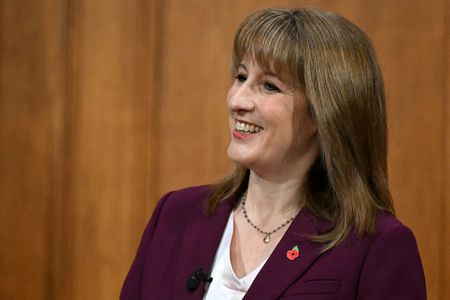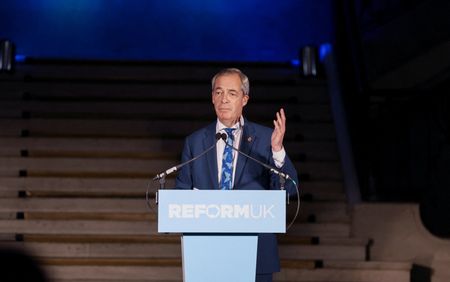LONDON (Reuters) -British finance minister Rachel Reeves is expected to raise tens of billions of pounds in taxes in her budget on Wednesday to stay on track for her self-imposed fiscal rules, a key issue for bond investors, and fund a likely increase in welfare spending.
Following are options Reeves is reportedly considering or has been urged to introduce to plug a budget shortfall and to increase her buffer against economic shocks. Any spending cuts are likely to be small.
INCOME TAX
Reeves and Prime Minister Keir Starmer told voters last year they would not raise taxes for “working people.” That promise has come under threat as the outlook for the public finances has worsened.
Reeves said on November 4 that “each of us must do our bit”, raising expectations of broad tax hikes. But on November 14, a government source said Reeves had no plans to raise income tax rates due to improved fiscal forecasts.
Instead, Reeves is expected to extend a freeze on the thresholds at which people pay basic and higher income tax rates by two years until 2030, raising about 8 billion pounds ($10.5 billion) a year.
PENSIONS
Reeves plans to reduce the income workers can divert from salaries into their pension pots without paying a social security levy, media reported. The Financial Times said on November 21 the change would raise 3-4 billion pounds a year.
Legal & General CEO Antonio Simoes has urged Reeves not to deter pension savers. Money managers have seen a rise in people making cash withdrawals from their pensions on fears that they might be taxed more heavily.
PROPERTY
A surcharge on a local tax paid by homeowners will be introduced for properties worth more than 2 million pounds, media reported. Reeves initially planned a 1.5 million-pound threshold for the surcharge, affecting three times as many homes, The Times said on November 25.
VAT
Value-added tax could be simplified by ending lower or zero rates for products such as food and children’s clothes. But that could add to what is already the highest inflation rate among big, rich economies. Tax experts say a lower starting point for businesses paying VAT would bring in more revenue and remove a barrier for growth among small firms.
FUEL DUTY
Fuel duty has been frozen since 2011. It is a big revenue-raiser, bringing in around 25 billion pounds a year, so ending the freeze could boost revenues. The Times said on November 4 that Reeves might scrap a temporary relief introduced in 2022.
BANKS
Think tanks have called for higher taxes on banks to claim back some of the billions of pounds of interest that lenders have received on reserves held at the Bank of England. Such a move could hurt lending and slow growth, bankers say.
Reeves said on October 16 she wanted to ensure there was a “competitive environment” for financial services firms.
The FT reported on November 24 that banks would be spared from a tax raid.
ELECTRIC CARS
Electric cars will face a new charge of 3 pence per mile driven, equivalent to 250 pounds a year for the average motorist, under a tax that will be announced to take effect in 2028, the Telegraph reported on November 6.
‘SIN TAXES’
Taxes on alcohol, tobacco, gambling and vaping could rise. Other options are air travel, plastics and sugary drinks. Higher “sin” taxes could prompt consumers to change their spending and limit the extra tax revenues. They could also be inflationary.
THE WEALTHY
Reeves has ruled out a new wealth tax but said on October 15 that higher taxes on the wealthy “will be part of the story”, leading to speculation that she might increase taxes on capital gains and other income sources.
EXIT TAX
The Times said on October 31 that Reeves might impose a 20% tax on wealthy people leaving the country, based on the value of their business assets, similar to taxes in other countries. The Sunday Times said on November 23 that the idea was supported by aides of Reeves but she had pushed back against it.
SAVINGS ACCOUNTS
A 20,000-pound tax-free limit for cash Individual Savings Accounts will be cut to 12,000 pounds in the hope of driving more money into the British stock market.
LAWYERS AND ACCOUNTANTS
The Times said on October 21 that Reeves was considering an increase in tax on people in limited liability partnerships, typically used by partners at large accountancy and law firms, angering professional bodies. The Times said on November 14 the plan was considered unworkable and had been dropped.
($1 = 0.7613 pounds)
(Writing by William Schomberg and David Milliken, editing by Ed Osmond)












